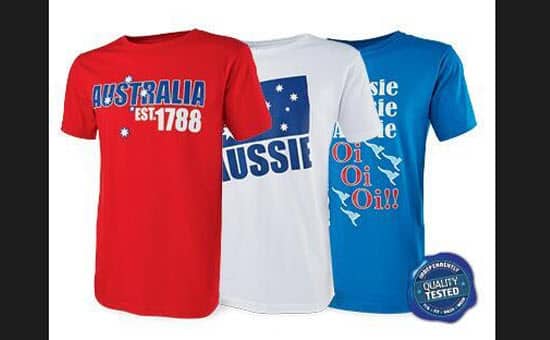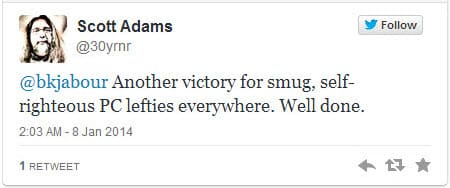When you try to please everyone, you please nobody
There was a recent incident in Australia where Aldi, a German supermarket, decided to pull a product from its shelves after receiving racism complaints.
The product in question was a t-shirt with the slogan, “Australia EST 1788”. The shirts were produced for Australia Day 2014, which will be celebrated on January 26th, Sunday week.
Before we consider Aldi’s lack of strategic nous, let’s first take a look at the slogan, the meaning behind it, and why some people think it’s racist.
The Background
The slogan “Australia EST 1788” is intended to celebrate Australia Day, and refers to the year in which the British first asserted sovereignty over the bits of land we now know as Australia.
Australia Day commemorates the day, in 1788, on which Captain Arthur Phillip rowed ashore in Sydney Cove and took possession of the land in the name of Kind George III with the view to establishing a penal colony. This was the first time that the British had sought to claim sovereignty over what was, at the time, known as “New Holland”. Legally speaking, the Federation of Australia did not actually come into existence until 1901, when the respective British colonies of Australia banded together and united under the constitution, but let’s not get technical.
The claims of racism appear to arise due to the way in which the British established sovereignty. Although there were Indigenous people inhabiting the Australian continent in 1788, the British never signed a treaty with them (unlike in New Zealand where the British signed a treaty with the Maoris). The Aborigines were a nomadic or semi-nomadic people and did not possess a European style government, nor have an identifiable leader with whom the British could sign a treaty. With no treaty in place, the British colonies and the Australian federal government after them continued to deny native title to the land under a doctrine known as Terra Nullius; in effect claiming that prior to 1788 the Australian continent was “land belonging to no one”.
While this was certainly a very unequal and regrettable state of affairs, and took many years to rectify, native title was finally recognised by the High Court in 1992 in the landmark Mabo Case.
For some, the historical quirks of how the British came to establish sovereignty make the statement “Australia EST 1788” a racist slogan. And there will always be vocal personalities, like Nathan Brennan, Nareen Young and Matt Mason, who will be quick to suggest that this is the case.
But for the vast majority of Australians, modern Australia is an idea worth celebrating. The Australian attitudes of mateship, a fair go, irreverence for established authority, and a common understanding that Australia is a lucky country all, in one way or another, trace their roots back to its beginnings, in 1788.
Digression
It is worth noting, however, that there are good fair dinkum reasons why the slogan “Australia EST 1788” may be problematic, but it has nothing to do with racism. It has to do with the unhelpful rise of an unjustified and excessive Australian nationalism over recent years.
University of Canberra Assistant Professor Robin Tennant-Wood told SMH that “the annual celebrations [have] grown to include a “yobbo element” of excessive drinking and targeting racial minorities as nationalism increased following events such as the Cronulla riots.” Tennant-Woods was further quoted as saying, “We see this particularly in young people, draped in the Australian flag and using it as an excuse to target people who don’t look like them … Nationalism is dangerous at best and it can be downright horrible if it gets out of control.”
The traditional Australian attitudes of mateship and irreverence for established authority are placed in direct conflict with the new and problematic shows of nationalism that Tennant-Woods is talking about.
Feeling lucky to be Australian is one thing, and should be encouraged, but feeling proud and noble and better than others just because they happen to have been born elsewhere is quite another matter entirely.
And so, while it has nothing to do with racism, per se, if slogans like “Australia EST 1788” are being used by beach bogans and Australian rednecks to justify excessive shows of nationalism and drunken hooliganism, then Aldi’s decision to pull the t-shirts may, on balance, have been a good one for Australia.
Aldi’s Strategic Blunder
But I digress.
Aldi and other department stores, like Big W, made a strategic decision to support Australia Day 2014 by selling certain celebratory Australia Day products, like the t-shirt we have been discussing above.
Given that most people in Australia are not political activists, career academics, beach bogans, or rednecks, Aldi’s decision to sell the t-shirt seems to have been a pretty reasonable one. Australia Day marks the arrival of the First Fleet in 1788, and the slogan references this historical event in a kind of cheeky way which makes Australia sound more like a product or a company, “Australia EST 1788”.
The vast majority of Australians would have been happy to consider buying the t-shirt without a second thought, and certainly without any thoughts of racism or excessive nationalism.
But, you can’t please everyone.
A small vocal minority of political activists and arm-chair critics decided that they didn’t like the slogan. They assumed it was racist. Racism, after all, is as good a reason as any to get angry about something.
And so, on Aldi’s own admission, “[t]he decision to remove the Australia Est 1788 design from [its product] range was taken following comments by a limited number of concerned customers.”
To avoid offending the vocal minority, Aldi removed a product that was never designed for them in the first place.
By retreating from the situation, Aldi implicitly confirms the accusations made against it and, at the same time, reduces its ability to profit from the Australia Day celebrations.
Aldi did make efforts to apologise for its actions stating, “Aldi Australia wants its customers to know it puts the community and their wishes first.” But the apology begs the question, which customers and which community does Aldi put first?
By trying to be all things to all people, Aldi has disappointed everyone. It has simultaneously been cast as a racist and disappointed a large number of ordinary, fun loving, law abiding Australians who would have been happy enough to buy its Australia Day t-shirt, and enjoy a cool beer by the pool.
A loss for Aldi, a dubious result for Australia, and as one Twitter commentator put it:


4 replies on “Who Is Your Customer?”
The creation of Australia in 1901 was more than a “technicality.” Even bogans buying $2 shirts at Aldi deserve historical accuracy.
The shirts were not racist. The problem is they just weren’t very cool shirts.
DJHamsterWizard79 – marketers often bend the truth in the attempt to create something catchy or cool. That doesn’t make this a hot political issue.
Eric – agreed. The shirts were not very trendy.
The thing is you need to present cool design, So printing something cool that everyone will love it. Though they are very nice shirts but not at that nice.